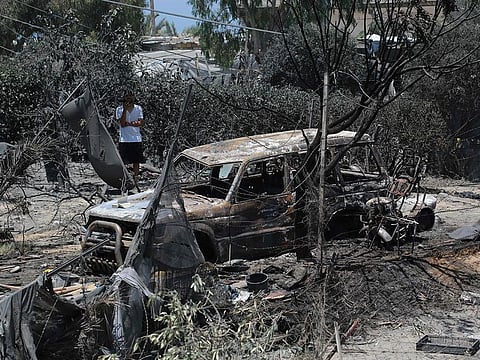How Gaza became an issue for voters in France, the UK and US
Events in Gaza are shaping election outcomes, highlighting deep divisions

Western democracies can sometimes be unpredictable, challenging common sense and most pre-election polls. Take the recent French legislative elections, for example. Most polls had predicted a sweeping victory for the far-right coalition, having swept most seats in the first round of the snap elections that President Emmanuel Macron had called for following the outcome of the European Parliament’s elections, which also favoured the French far-right.
But in the decisive second round, a broad alliance of the far left, centre left, communist, and progressive parties was able to stop the far right advance in its tracks, denying it a historical opportunity to form a far-right government, the first since the Second World War.
The main driver behind a record voter turnout was the youth and first-time voters, who rallied to prevent the far right from taking over. But while this was a victory for the liberals, the left, and the greens, it was also a symbolic triumph for the supporters of the Palestinian cause.
Palestinian flags were being flown in central Parisian squares as jubilant voters celebrated a momentous victory over the far right. The left’s triumph became synonymous with supporting the Palestinians against decades of Israeli repression and the slaughter that is taking place in Gaza.
Also Read: Is Israel annexing the West Bank?
A decisive victory
The far-right had expressed overt support for Israel and its war against Hamas. Its leader, Jordan Bardella, had vowed never to recognise a Palestinian state. But in contrast, the head of the far-left party France Unbowed, in the National Assembly, said, in the wake of the election results, that Paris would soon recognise the state of Palestine.
In the United Kingdom, all polls had predicted a landslide victory for the Labor Party against the Conservatives, and on 4 July, this was the outcome. After 14 long years of Tory rule characterised by harsh austerity measures and the demise of national welfare services like National Health, once the pride of the British people, voters came out to end the Conservative era and hand Labor a decisive victory.
But it was a controversial win for Labor, too. It lost against independent candidates, the majority of whom had denounced Labour and Conservative positions on Israel’s war on Gaza.
The former pro-Palestine Labor leader Jeremy Corbyn ran as an independent and won, while five others succeeded in unseating their Labor rivals, including the senior Labor lawmaker Jon Ashworth, who lost to Shockat Adam. In contrast, no independent had won in the 2019 elections.
Corbyn lost the party’s leadership as he was accused of turning the party against Israel.
The new Foreign Secretary, David Lammy, suggested that the new government could recognise the state of Palestine at some point. It was also reported that the new Labour government is now withdrawing its objection to the International Criminal Court (ICC) issuing arrest warrants against Israeli Prime Minister Benjamin Netanyahu and top aides.
Since shocking images of Israel’s atrocities in Gaza began to appear on social media platforms, there have been weekly pro-Palestine demonstrations in London, Paris, and other Western capitals. Initially, European governments tried to declare them unlawful, but in the end, the protesters prevailed.
US presidential elections
The Palestine/Gaza issue is also becoming crucial in the US presidential elections. The Democratic Party is divided as progressives have become openly critical of the policies of the White House and its support of what they describe as a genocidal war by Israel in Gaza.
Tens of thousands of Muslim and Arab voters, who traditionally vote Democrat, have shunned President Joe Biden’s primaries campaign, opting to vote uncommitted. Their position, along with millions of liberal youth, may end up costing Biden the elections in November.
In contrast, some Republican lawmakers have accused Biden of abandoning Israel. The polarisation over Israel/Palestine has never been more profound and more acute in an election season.
As PM Benjamin Netanyahu is scheduled to speak to a joint session of Congress on 24 July, most Democratic lawmakers said they would boycott the session, while activists are now calling for mass demonstrations in Washington, D.C., against Netanyahu’s visit.
Voters in France and the UK were mobilised by many issues, such as immigration, personal freedom, austerity, and dire economic conditions. Most had voted against the ruling establishment and the status quo. But support for the Palestinians has emerged as one issue where voters were mobilised. This important milestone could become a game-changer in the political dynamics.
The same could happen with the US elections in November. Whether Biden or his Vice President, Kamala Harris, faces Donald Trump, Israel’s war on Gaza, which may still be raging in November, will play a part on polling day.
Osama Al Sharif is a journalist and political commentator based in Amman.
Sign up for the Daily Briefing
Get the latest news and updates straight to your inbox



